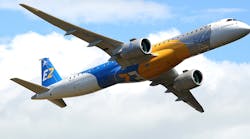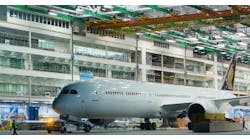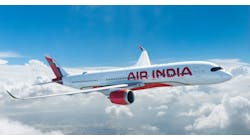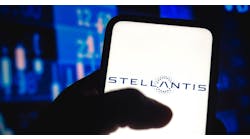Jet-builder Embraer SA and Pratt & Whitney agreed to collaborate for integrated ground and flight tests for 100% Sustainable Aviation Fuel in an E195-E2 aircraft powered by a P&W geared turbofan engine. The effort adds to other tests underway by Airbus, Boeing, GE Aviation, Rolls-Royce, and others to establish the capabilities and needs of current technologies to reduce carbon emissions in commercial aviation.
In their statement, Embraer and Pratt said their effort supports the commercial aerospace industry’s goal of reaching net-zero CO2 emissions by 2050. The partners did not describe the schedule for their test program.
“We are committed to continually enhancing the efficiency and performance of our products, and by further extending their compatibility with SAF, we will enable our customers to operate as sustainably as possible,” stated Arjan Meijer, president and CEO, Embraer Commercial Aviation.
Sustainable Aviation Fuel (SAF) is produced from waste oils derived from biological sources (e.g., cooking oil, other non-palm waste oils from plants, agricultural residue, or non-fossil CO2), or solid waste from homes or businesses (e.g., packaging, paper, textiles, food waste.)
Currently, commercial aircraft are certified to operate on a maximum of 50% SAF blended with conventional jet fuel, though aircraft and jet-engine manufacturers have made commitments to increase the effective applicability of the alternative fuel.
In recent weeks Rolls-Royce has reported positive results of SAF flight tests of its Rolls-Royce Trent XWB engines powering an Airbus A350 jet, and of a Trent 1000 engine aboard a Boeing 747 flying test bed.
Pratt & Whitney engines are installed on various Embraer jets, including the E-Jets E2 series commercial jets. The GTF™ series engines are credited with improving the fuel efficiency and lowering CO2 emissions versus the previous generation E195.
“Pratt & Whitney has been active in SAF testing and certification for almost two decades. We will strategically continue to support 100% SAF flight tests for key customers that expand SAF uptake, including partnering with Embraer to test the E-Jets E2 aircraft on 100% SAF as part of their 2050 net zero emissions target,” stated Graham Webb, chief sustainability officer.






